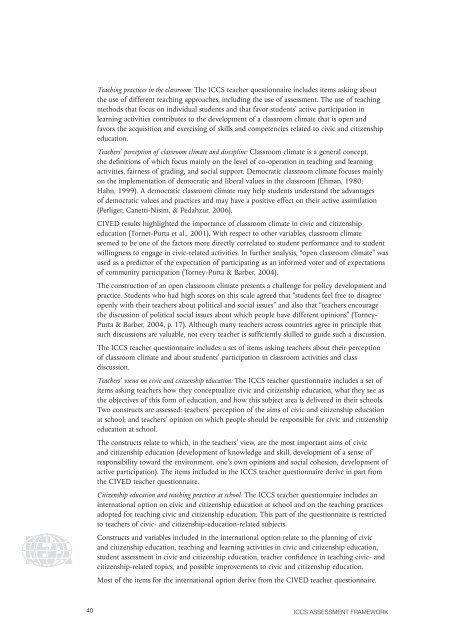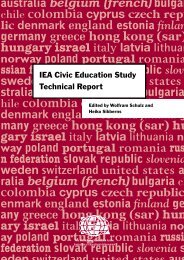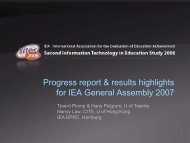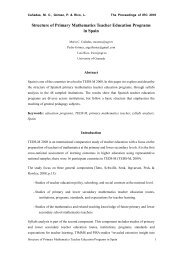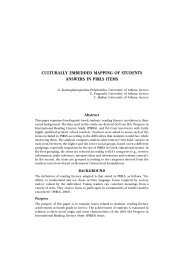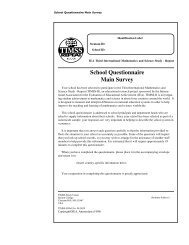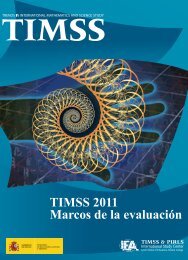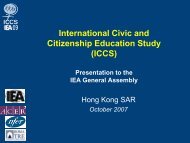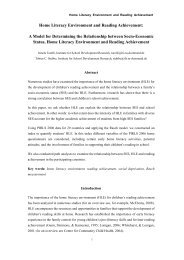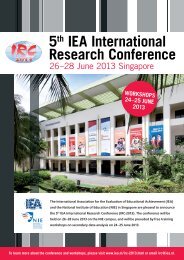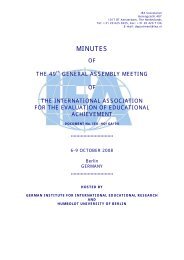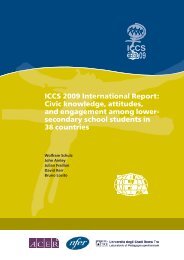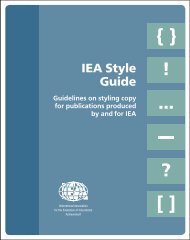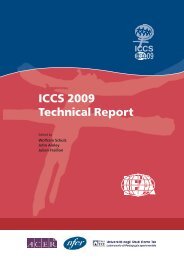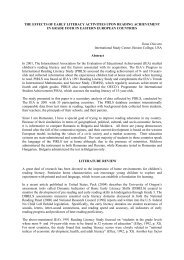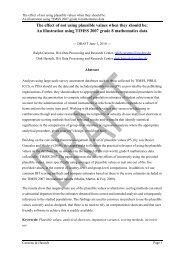International civic and citizenship education study - iccs - IEA
International civic and citizenship education study - iccs - IEA
International civic and citizenship education study - iccs - IEA
- TAGS
- civic
- citizenship
- iccs
- www.iea.nl
Create successful ePaper yourself
Turn your PDF publications into a flip-book with our unique Google optimized e-Paper software.
Teaching practices in the classroom: The ICCS teacher questionnaire includes items asking about<br />
the use of different teaching approaches, including the use of assessment. The use of teaching<br />
methods that focus on individual students <strong>and</strong> that favor students’ active participation in<br />
learning activities contributes to the development of a classroom climate that is open <strong>and</strong><br />
favors the acquisition <strong>and</strong> exercising of skills <strong>and</strong> competencies related to <strong>civic</strong> <strong>and</strong> <strong>citizenship</strong><br />
<strong>education</strong>.<br />
Teachers’ perception of classroom climate <strong>and</strong> discipline: Classroom climate is a general concept,<br />
the definitions of which focus mainly on the level of co-operation in teaching <strong>and</strong> learning<br />
activities, fairness of grading, <strong>and</strong> social support. Democratic classroom climate focuses mainly<br />
on the implementation of democratic <strong>and</strong> liberal values in the classroom (Ehman, 1980;<br />
Hahn, 1999). A democratic classroom climate may help students underst<strong>and</strong> the advantages<br />
of democratic values <strong>and</strong> practices <strong>and</strong> may have a positive effect on their active assimilation<br />
(Perliger, Canetti-Nisim, & Pedahzur, 2006).<br />
CIVED results highlighted the importance of classroom climate in <strong>civic</strong> <strong>and</strong> <strong>citizenship</strong><br />
<strong>education</strong> (Tornet-Purta et al., 2001). With respect to other variables, classroom climate<br />
seemed to be one of the factors more directly correlated to student performance <strong>and</strong> to student<br />
willingness to engage in <strong>civic</strong>-related activities. In further analysis, “open classroom climate” was<br />
used as a predictor of the expectation of participating as an informed voter <strong>and</strong> of expectations<br />
of community participation (Torney-Purta & Barber, 2004).<br />
The construction of an open classroom climate presents a challenge for policy development <strong>and</strong><br />
practice. Students who had high scores on this scale agreed that “students feel free to disagree<br />
openly with their teachers about political <strong>and</strong> social issues” <strong>and</strong> also that “teachers encourage<br />
the discussion of political social issues about which people have different opinions” (Torney-<br />
Purta & Barber, 2004, p. 17). Although many teachers across countries agree in principle that<br />
such discussions are valuable, not every teacher is sufficiently skilled to guide such a discussion.<br />
The ICCS teacher questionnaire includes a set of items asking teachers about their perception<br />
of classroom climate <strong>and</strong> about students’ participation in classroom activities <strong>and</strong> class<br />
discussion.<br />
Teachers’ views on <strong>civic</strong> <strong>and</strong> <strong>citizenship</strong> <strong>education</strong>: The ICCS teacher questionnaire includes a set of<br />
items asking teachers how they conceptualize <strong>civic</strong> <strong>and</strong> <strong>citizenship</strong> <strong>education</strong>, what they see as<br />
the objectives of this form of <strong>education</strong>, <strong>and</strong> how this subject area is delivered in their schools.<br />
Two constructs are assessed: teachers’ perception of the aims of <strong>civic</strong> <strong>and</strong> <strong>citizenship</strong> <strong>education</strong><br />
at school; <strong>and</strong> teachers’ opinion on which people should be responsible for <strong>civic</strong> <strong>and</strong> <strong>citizenship</strong><br />
<strong>education</strong> at school.<br />
The constructs relate to which, in the teachers’ view, are the most important aims of <strong>civic</strong><br />
<strong>and</strong> <strong>citizenship</strong> <strong>education</strong> (development of knowledge <strong>and</strong> skill, development of a sense of<br />
responsibility toward the environment, one’s own opinions <strong>and</strong> social cohesion, development of<br />
active participation). The items included in the ICCS teacher questionnaire derive in part from<br />
the CIVED teacher questionnaire.<br />
Citizenship <strong>education</strong> <strong>and</strong> teaching practices at school: The ICCS teacher questionnaire includes an<br />
international option on <strong>civic</strong> <strong>and</strong> <strong>citizenship</strong> <strong>education</strong> at school <strong>and</strong> on the teaching practices<br />
adopted for teaching <strong>civic</strong> <strong>and</strong> <strong>citizenship</strong> <strong>education</strong>. This part of the questionnaire is restricted<br />
to teachers of <strong>civic</strong>- <strong>and</strong> <strong>citizenship</strong>-<strong>education</strong>-related subjects.<br />
Constructs <strong>and</strong> variables included in the international option relate to the planning of <strong>civic</strong><br />
<strong>and</strong> <strong>citizenship</strong> <strong>education</strong>, teaching <strong>and</strong> learning activities in <strong>civic</strong> <strong>and</strong> <strong>citizenship</strong> <strong>education</strong>,<br />
student assessment in <strong>civic</strong> <strong>and</strong> <strong>citizenship</strong> <strong>education</strong>, teacher confidence in teaching <strong>civic</strong>- <strong>and</strong><br />
<strong>citizenship</strong>-related topics, <strong>and</strong> possible improvements to <strong>civic</strong> <strong>and</strong> <strong>citizenship</strong> <strong>education</strong>.<br />
Most of the items for the international option derive from the CIVED teacher questionnaire.<br />
40 ICCS ASSeSSment FrAmework


